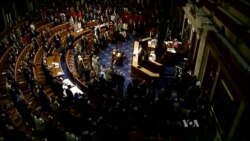Voters in three crucial battleground states - Florida, Ohio and Pennsylvania - overwhelmingly oppose the Obama administration-backed international nuclear deal with Iran, according to a recent opinion poll by Quinnipiac University. The candidates vying for their respective party's nomination for the 2016 presidential race are taking notice and staking out their own positions.
Presidential candidates have been out on the campaign trail in full force recently, having fun mingling with potential voters. But the serious issue keeps surfacing of how to best keep Iran from acquiring nuclear weapons.
Republicans oppose deal
Republican front-runner and business tycoon Donald Trump has repeatedly blasted the deal, saying America never wins at anything anymore.
“We make this horrible deal with Iran, which is a disgrace, and by the way could be one of the worst deals, depending on what ultimately happens. It could go down as one of the worst deals in history," he proclaimed.
But Trump also told NBC's Meet the Press that he is so good at looking at deals and contracts that he could police it so "tough" that the Iranians don't have a chance to cheat.
When Republican presidential candidate Mike Huckabee recently visited Israel, he echoed Israeli Prime Minister Benjamin Netayahu, condemning the Iran nuclear deal as a clear and present danger to both Israel and the United States.
“This does not accomplish anything other than empowering a rogue nation – a nation that has shown consistently its intention to wipe other nations, including America, right off the map," he said.
Wisconsin governor and Republican candidate Scott Walker has similar beliefs, saying “As president, I will terminate the deal with Iran the first day, reinstate the sanctions, work with Congress to put more in place - more crippling sanctions - and convince our allies to do the same.”
Former Florida governor and Republican candidate Jeb Bush is more cautious.
“One thing I won’t do is say tear up the agreement on the first day. But maybe you ought to check with your allies first and have your team in place," he said.
Most Democrats back deal
On the Democratic side, both leading contenders, Hillary Clinton and Bernie Sanders, support the deal. Enforcement will be key, says former Secretary of State Clinton.
"This does put a lid on the nuclear program, but we still have a lot of concern about the bad behavior and the actions by Iran," she said.
Sanders, a senator from Vermont, also defended the deal, saying it is not perfect, but the only real alternative is war with Iran. Sanders is a registered independent but is seeking the Democratic Party's nomination for president next year.
Some prominent Democrats have come out against the Iran nuclear deal. But most Democrats back it, while most Republicans strongly oppose it.
“The number-one goal for Democrats is to avoid immediate hostilities," political analyst Stuart Rothenberg explains. "The number-one goal for Republicans is a little different. They are willing to kind of push the envelope more because they so distrust Iran, and so don’t believe they are so convinced that Iran won’t live up to the deal.”
The U.S. Congress set itself a deadline of September 17 to hold a vote to either reject or approve the Iran nuclear deal. If the deal is rejected, President Barack Obama has said he would veto that result.
For now, it appears unlikely Republicans could gather enough votes to override a veto in either the Senate or House of Representatives.














